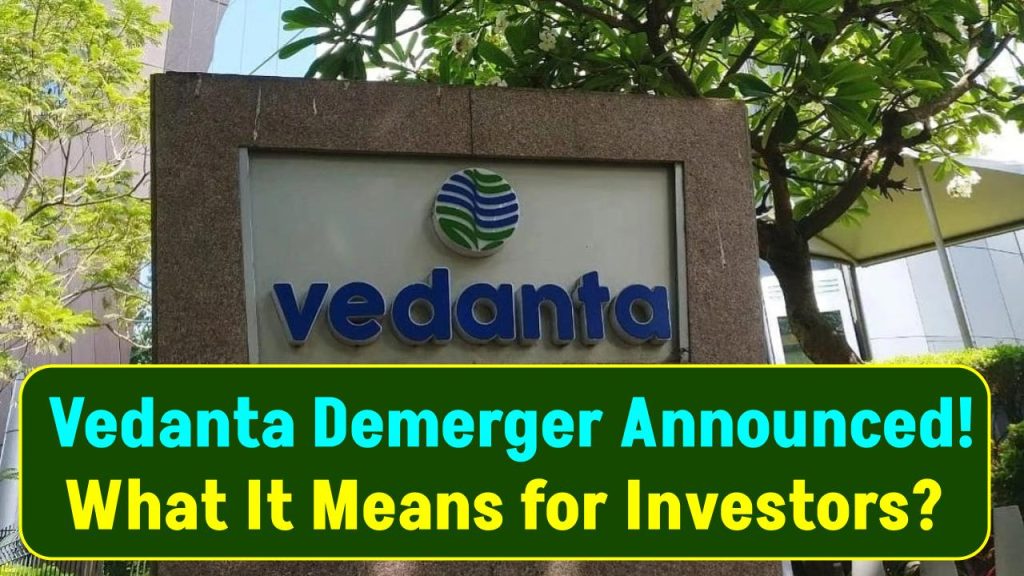
Vedanta Limited, one of India’s largest conglomerates, has officially received shareholder and creditor approval for a major demerger aimed at unlocking value and streamlining operations. This decision will split the company into five independent entities, each focusing on specific sectors. The move has sparked both optimism and concerns among investors, raising the question: Is this a golden opportunity or a risky bet?
This article breaks down Vedanta’s demerger, its implications for investors, potential benefits, risks, and expert insights to help you make an informed decision.
Vedanta Demerger Announced
| Aspect | Details |
|---|---|
| What’s Happening? | Vedanta is splitting into five separate companies |
| Entities Created | 1) Vedanta Aluminium Metal Ltd. 2) Vedanta Oil & Gas Ltd. 3) Vedanta Power Ltd. 4) Vedanta Iron & Steel Ltd. 5) Vedanta Ltd. (Base metals business) |
| Why the Demerger? | To enhance transparency, improve efficiency, and unlock shareholder value |
| Investor Impact | Shareholders receive 1 additional share in each new company for every Vedanta Ltd. share owned |
| Potential Benefits | Focused sectoral growth, better debt management, and improved valuations |
| Risks & Concerns | Market volatility, operational challenges, and regulatory hurdles |
| Regulatory Status | Approved by shareholders, awaiting final regulatory approvals |
| Official Website | Vedanta Limited |
Vedanta’s demerger is a bold move with both opportunities and risks. Investors stand to benefit from specialized businesses and better valuations, but execution challenges and market volatility remain key concerns.
For investors, the key takeaway is:
- Long-term potential looks promising
- Short-term fluctuations are expected
- Do your research before investing!
What is the Vedanta Demerger Announced?
Vedanta Limited is a diversified natural resources company with businesses spanning metals, power, oil & gas, and mining. The company announced its demerger plan in 2023, and on February 20, 2025, shareholders and creditors approved it.
The goal of this demerger is to split Vedanta into five separate, sector-focused companies to improve operational efficiency, debt management, and stock performance.
Vedanta Demerger Announced: The Five New Vedanta Companies
Each newly formed company will focus on a specific sector, allowing investors to allocate their funds based on their preferred industry.
Vedanta Aluminum Metal Limited
- Focus: Aluminium production & processing
- Largest aluminium producer in India, a critical sector for electric vehicles (EVs) and infrastructure.
Vedanta Oil & Gas Limited
- Focus: Oil & gas exploration & production
- Aims to boost domestic energy security, especially amid fluctuating global oil prices.
Vedanta Power Limited
- Focus: Power generation
- Involved in thermal and renewable energy projects, a key sector in India’s green energy push.
Vedanta Iron and Steel Limited
- Focus: Iron & steel manufacturing
- Aims to expand domestic steel production to meet growing infrastructure demand.
Vedanta Limited (Base Metals Business)
- Focus: Zinc, copper, and lead mining
- Retains the Hindustan Zinc Ltd. (HZL) stake, making it a crucial entity in India’s mining sector.
Shareholder Impact: For every 1 Vedanta Limited share owned, shareholders will receive 1 additional share in each of the newly formed companies.
Vedanta Demerger Announced: Why is Vedanta Splitting?
This decision aligns with the company’s long-term strategy to unlock value by:
- Creating focused and efficient businesses
- Reducing debt by distributing financial burdens across multiple entities
- Attracting sector-specific investors
- Improving stock valuation and performance
According to Vedanta’s Chairman, Anil Agarwal, the demerger will maximize shareholder returns and boost India’s industrial growth.
Expert View:
Analysts predict the demerger could result in higher valuations for Vedanta’s businesses, similar to successful past demergers (e.g., Reliance Industries’ Jio Financial Services spinoff). However, the execution risk remains a concern.
Potential Benefits of the Vedanta Demerger Announced
Focused Growth in Each Sector
Each company can operate independently, with sector-specific strategies and leadership.
- Aluminum & steel to benefit from India’s infrastructure boom
- Power sector to gain from government push for renewable energy
- Oil & gas can secure energy independence
Better Debt Management
Vedanta has high debt levels (~$13 billion in FY 2024). The demerger allows for better debt restructuring and independent capital raising.
Increased Transparency for Investors
Sector-specific investors can now invest directly in their preferred industry, avoiding exposure to unrelated businesses.
Potential for Higher Valuations
Similar past demergers have shown that specialized companies often attract premium valuations.
Example: Reliance’s Jio Financial Services spinoff led to better performance of both Jio and Reliance Industries Ltd.
Risks & Concerns for Investors
While the demerger offers many advantages, it also comes with potential challenges.
Market Volatility
- Stock prices may fluctuate as markets adjust to the new corporate structure.
- Investors should expect short-term instability before long-term gains.
Execution Challenges
- Setting up independent management, financials, and regulatory approvals is complex.
- If not handled well, it could lead to inefficiencies and operational delays.
Debt & Liquidity Risks
- Vedanta’s high debt could still impact the newly formed companies.
- Investors should monitor how debt is divided and managed post-demerger.
Regulatory Approvals & Compliance
- The demerger requires final regulatory approvals from SEBI and other authorities.
- Any delays could impact timelines and investor confidence.
Should You Invest in Vedanta Announced Post-Demerger?
This depends on your risk appetite and investment strategy.
Who Might Benefit?
- Long-term investors looking for exposure to India’s booming infrastructure, power, and metals sectors.
- Sector-focused investors preferring targeted investments in aluminium, oil & gas, power, or mining.
- Growth investors betting on a potential valuation increase post-demerger.
Who Should Be Cautious?
- Short-term traders, as market volatility is expected in the transition phase.
- Investors concerned about Vedanta’s debt burden should closely monitor debt allocation.
- New investors unfamiliar with commodity cycles should seek expert advice before investing.
Vedanta Demerger Announced (FAQs)
What is the timeline for Vedanta’s demerger?
The demerger has been approved by shareholders, but final execution depends on regulatory approvals. It is expected to be completed in 2025.
Will existing Vedanta shareholders lose money?
No, shareholders will receive 1 share in each new company per Vedanta Ltd. share owned, meaning no dilution of investment.
What happens to Vedanta’s debt?
Vedanta’s $13 billion debt will be distributed among the five companies, reducing the burden on any single entity.
Is this similar to Reliance’s Jio Financial demerger?
Yes, similar to Reliance, Vedanta aims to unlock value through a sector-based spinoff, which could attract higher valuations.









